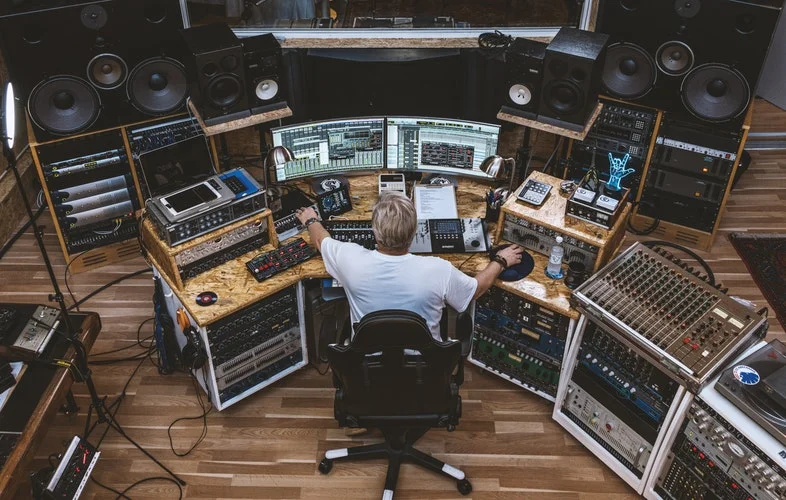What Is Mastering and Why Should I Care?
How important is mastering your music?
Do you need to master it well?
I like to think of not mastering a final mix is like The Beatles not recording with George Martin.
It is critical to the success of your music. Here are some big reasons why it is so important in sync…
This post was originally written as a blog for our online recording studio, Sundown Sessions Studio.
Mastering music is a part of the music production that is shrouded in mystery. I constantly found myself questioning what mastering was when I was first getting started as an audio engineering. I didn't understand why I should even bother sending my music to a mastering engineer.
Don't forget that there is always a part called "mastering" for albums. Mixing isn't the final stage of the process
— Rich (@5hRich) April 23, 2014
My tracks suffered because of this and unfortunately many other musicians and engineers also fail to recognize how integral proper mastering is. Things are even worse these days with mastering plugins and online tools that claim to automatically master music.
None of these options compare to a proper professional mastering engineer. As the last step of the music production process, one needs to understand why it’s necessary to get someone who knows what they’re doing.
This article delves into several important aspects of getting your music mastered in hopes clearing the air and saving mixing engineers from hurting their tracks.
1. It Brings Music To Broadcast (and Streaming) Standards
There’s still a myth floating around that the point of mastering music is to make a track as loud as possible. People believe that this is what’s needed to keep their music competing with the rest.
Mastering music for streaming involves more than just making things as loud as possible.
However, thanks to the popularity of streaming music this is no longer the case and the end of the “loudness wars” is in sight. Nowadays, music is required by streaming platforms to hit a certain standard based on a dynamic measurement tool known as LUFS.
Surprisingly enough, if you get your track mastered with heavy compression to be as loud as possible, it could actually end up turned down to and quieter than other tracks on streaming services. To fully understand this concept, check out the video below.
This is a huge change for the music industry and is an awesome opportunity for musicians to express themselves in a dynamic fashion. However, this means that it’s important to work with a mastering engineer that fully understands this concept.
A professional will master your music to be at the optimum place for all major streaming platforms.
2. Mastering Creates A Cohesive Listening Experience
If you’ve gone the route of recording an album at home, chances are you’ve done so over a long period of time. You probably didn’t use the same approach for tracking or mixing across all songs.
This is totally normal, however it makes it difficult to play the tracks in any consecutive order as an album. If you do, the experience may be quite jarring for your listener. Each track would star at a different volume level and the flow between the music would be off.
This is where your mastering engineer comes in. It’s their job to find a way to make all the songs in the artists album flow together as one cohesive piece.
To do this they may balance the levels of tracks, EQ for a more similar spectral sound and add proper amounts of silence between songs. Once finished the mastering process will make your music a much more digestible and enjoyable experience.
3. A Second Set of Ears
Every musical project can benefit from an outside opinion and a mastering engineer is a great last line of defense. After listening to the same mix for hours on end your ears become biased and you won’t notice certain issues.
Thankfully the mastering engineer can catch these problems in your mix and fix them before anyone else hears. Beyond just fixing problems themselves, they’ll often give you optional mix tips that you can improve on before they do their work.
Not only will this improve your current track but it makes you a better mixing engineer long term. You’ll be able to take this professional advice and apply it to future music mixing before getting it mastered.
4. Your Monitors Are Hurting Your Mix
You may have very high end monitors for a home studio but they will be nothing compared to what your mastering engineer uses. There's a misconception around mastering engineers owning tons of different types of speakers.
There’s some slight truth to this as a mastering engineer may own two or three different sized speakers but they’ll do the majority of their work on a single set.
However, this set will be some of the best in the industry and often cost tens of thousands of dollars. This allows them to get an accurate picture of your track across the spectrum and make educated decisions on how it will size up on various sound systems.
To over simplify things, your low end may be mixed great, as well as your high end. However, the balance between these areas may be off without your knowledge, due to monitor bias. Thankfully the mastering engineer will catch these problems in your music with their flat response monitors and be able to correct any mistakes.
5. A Professional Edge
Many independent artists may not have the budget to track their album in a high end studio or to get it mixed by a professional. Instead they end up doing the bulk of this work themselves.
This is a pretty standard approach to music production nowadays. Which means that if you go the extra mile and hire a mastering engineer to add the finishing touches on a mix, it can really give you a leg up on the competition.
It’s much cheaper than going into a recording studio, or hiring someone to mix your music. However, the results can still have a very strong impact on an otherwise indie sounding track.
6. Not Every Mixing Engineer Can Master Music
Too many times a mixing engineer won't understand the role of mastering yet advertises their services to master music. There are amazing engineers out their who can mix and master music but a select few can do both properly.
An amateur engineer may attempt to “master” a track in detrimental ways. The result in this case is often a mix that sounds worse than your original work. This shouldn't scare you away from mastering. However, you should make sure you exercise caution when hiring someone.
At its core a mastering engineer is someone with a wealth of experience in the industry. They have amazing ears and within the first listen will have a strong idea of what your music needs.
Always remember that you get what you pay for when it comes to mastering music. Don’t always believe someone if they say they’re a mastering engineer either. Ask to hear their portfolio and look for mastering engineers who’ve worked with notable acts and musicians in your genre.
Where To Master Your Music and Where Not To
7. What Not To Do
As already mentioned, it’s recommended that you stay away from online services that advertise automatic mastering. You upload your track to these sites and a computer tries its best to mimic the mastering process.
Mastering however relies on what the engineer hears more than anything else. A computer may be able to look at things like dynamics and frequency content. However, it has no sense of things like groove, emotion and feel.
Because of this your tracks will end up sounding flat, lifeless and worse off if mastered by a computer. The same goes with mastering plugins that act in exactly the same way.
You also want to avoid those charging hardly anything for their mastering services. Those $5/track deals seem tempting at first. However, the price translates into a lack of experience and effort put into your music.
If you go this route you’ll receive a less than satisfying master and end up spending more for revisions to improve it.
Get a Professional
So, where should you go? The first option is to find a reputable local source you can work with. Talk to some of your local studios or speak to other respectable artists in your genre. Find out where they master their music and approach the same engineers.
The second option is to find a reputable mastering engineer online. It can be difficult to sift through the mass amounts of people claiming to be mastering engineers but Sundown Sessions has you covered!
Our online recording studio connects independent artists to many of the industries top mastering and mixing engineers. We offer quality mixing and mastering at a competitive rate. Our engineers are the best around, having worked on more Grammy and award winning albums than we can count!
Conclusion
Mastering music goes beyond simply compressing a track and adding a bit of EQ. It’s the last stage of the music process and therefore the most important to get right.
The mastering engineer acts as a second set of highly trained ears that can catch mistakes in your mix, create a cohesive listening experience and bring your audio up to broadcast standards.
Stay away from cheap or computer generated, automatic services. Instead hire a professional mastering engineer with a wealth of experience in the industry. This gives your music a professional edge necessary to stand out and take your music career to the next level.
If you enjoyed this article be sure to check out the rest of the Sundown Sessions Blog for more tips and tricks of home recording and mixing music.





